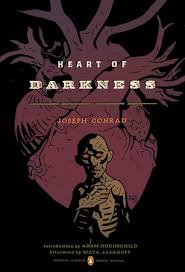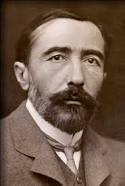Heart of Darkness Page #12
Heart of Darkness is a novella by Polish-British novelist Joseph Conrad, about a voyage up the Congo River into the Congo Free State, in the heart of Africa, by the story's narrator Charles Marlow.
“This devoted band called itself the Eldorado Exploring Expedition, and I believe they were sworn to secrecy. Their talk, however, was the talk of sordid buccaneers: it was reckless without hardihood, greedy without audacity, and cruel without courage; there was not an atom of foresight or of serious intention in the whole batch of them, and they did not seem aware these things are wanted for the work of the world. To tear treasure out of the bowels of the land was their desire, with no more moral purpose at the back of it than there is in burglars breaking into a safe. Who paid the expenses of the noble enterprise I don't know; but the uncle of our manager was leader of that lot. “In exterior he resembled a butcher in a poor neighbourhood, and his eyes had a look of sleepy cunning. He carried his fat paunch with ostentation on his short legs, and during the time his gang infested the station spoke to no one but his nephew. You could see these two roaming about all day long with their heads close together in an everlasting confab. “I had given up worrying myself about the rivets. One's capacity for that kind of folly is more limited than you would suppose. I said Hang!--and let things slide. I had plenty of time for meditation, and now and then I would give some thought to Kurtz. I wasn't very interested in him. No. Still, I was curious to see whether this man, who had come out equipped with moral ideas of some sort, would climb to the top after all and how he would set about his work when there.” II “One evening as I was lying flat on the deck of my steamboat, I heard voices approaching--and there were the nephew and the uncle strolling along the bank. I laid my head on my arm again, and had nearly lost myself in a doze, when somebody said in my ear, as it were: 'I am as harmless as a little child, but I don't like to be dictated to. Am I the manager--or am I not? I was ordered to send him there. It's incredible.' ... I became aware that the two were standing on the shore alongside the forepart of the steamboat, just below my head. I did not move; it did not occur to me to move: I was sleepy. 'It is unpleasant,' grunted the uncle. 'He has asked the Administration to be sent there,' said the other, 'with the idea of showing what he could do; and I was instructed accordingly. Look at the influence that man must have. Is it not frightful?' They both agreed it was frightful, then made several bizarre remarks: 'Make rain and fine weather--one man--the Council--by the nose'--bits of absurd sentences that got the better of my drowsiness, so that I had pretty near the whole of my wits about me when the uncle said, 'The climate may do away with this difficulty for you. Is he alone there?' 'Yes,' answered the manager; 'he sent his assistant down the river with a note to me in these terms: “Clear this poor devil out of the country, and don't bother sending more of that sort. I had rather be alone than have the kind of men you can dispose of with me.” It was more than a year ago. Can you imagine such impudence!' 'Anything since then?' asked the other hoarsely. 'Ivory,' jerked the nephew; 'lots of it--prime sort--lots--most annoying, from him.' 'And with that?' questioned the heavy rumble. 'Invoice,' was the reply fired out, so to speak. Then silence. They had been talking about Kurtz. “I was broad awake by this time, but, lying perfectly at ease, remained still, having no inducement to change my position. 'How did that ivory come all this way?' growled the elder man, who seemed very vexed. The other explained that it had come with a fleet of canoes in charge of an English half-caste clerk Kurtz had with him; that Kurtz had apparently intended to return himself, the station being by that time bare of goods and stores, but after coming three hundred miles, had suddenly decided to go back, which he started to do alone in a small dugout with four paddlers, leaving the half-caste to continue down the river with the ivory. The two fellows there seemed astounded at anybody attempting such a thing. They were at a loss for an adequate motive. As to me, I seemed to see Kurtz for the first time. It was a distinct glimpse: the dugout, four paddling savages, and the lone white man turning his back suddenly on the headquarters, on relief, on thoughts of home--perhaps; setting his face towards the depths of the wilderness, towards his empty and desolate station. I did not know the motive. Perhaps he was just simply a fine fellow who stuck to his work for its own sake. His name, you understand, had not been pronounced once. He was 'that man.' The half-caste, who, as far as I could see, had conducted a difficult trip with great prudence and pluck, was invariably alluded to as 'that scoundrel.' The 'scoundrel' had reported that the 'man' had been very ill--had recovered imperfectly.... The two below me moved away then a few paces, and strolled back and forth at some little distance. I heard: 'Military post--doctor--two hundred miles--quite alone now--unavoidable delays--nine months--no news--strange rumours.' They approached again, just as the manager was saying, 'No one, as far as I know, unless a species of wandering trader--a pestilential fellow, snapping ivory from the natives.' Who was it they were talking about now? I gathered in snatches that this was some man supposed to be in Kurtz's district, and of whom the manager did not approve. 'We will not be free from unfair competition till one of these fellows is hanged for an example,' he said. 'Certainly,' grunted the other; 'get him hanged! Why not? Anything--anything can be done in this country. That's what I say; nobody here, you understand, here, can endanger your position. And why? You stand the climate--you outlast them all. The danger is in Europe; but there before I left I took care to--' They moved off and whispered, then their voices rose again. 'The extraordinary series of delays is not my fault. I did my best.' The fat man sighed. 'Very sad.' 'And the pestiferous absurdity of his talk,' continued the other; 'he bothered me enough when he was here. “Each station should be like a beacon on the road towards better things, a centre for trade of course, but also for humanizing, improving, instructing.” Conceive you--that ass! And he wants to be manager! No, it's--' Here he got choked by excessive indignation, and I lifted my head the least bit. I was surprised to see how near they were--right under me. I could have spat upon their hats. They were looking on the ground, absorbed in thought. The manager was switching his leg with a slender twig: his sagacious relative lifted his head. 'You have been well since you came out this time?' he asked. The other gave a start. 'Who? I? Oh! Like a charm--like a charm. But the rest--oh, my goodness! All sick. They die so quick, too, that I haven't the time to send them out of the country--it's incredible!' 'Hm'm. Just so,' grunted the uncle. 'Ah! my boy, trust to this--I say, trust to this.' I saw him extend his short flipper of an arm for a gesture that took in the forest, the creek, the mud, the river--seemed to beckon with a dishonouring flourish before the sunlit face of the land a treacherous appeal to the lurking death, to the hidden evil, to the profound darkness of its heart. It was so startling that I leaped to my feet and looked back at the edge of the forest, as though I had expected an answer of some sort to that black display of confidence. You know the foolish notions that come to one sometimes. The high stillness confronted these two figures with its ominous patience, waiting for the passing away of a fantastic invasion.
Translation
Translate and read this book in other languages:
Select another language:
- - Select -
- 简体中文 (Chinese - Simplified)
- 繁體中文 (Chinese - Traditional)
- Español (Spanish)
- Esperanto (Esperanto)
- 日本語 (Japanese)
- Português (Portuguese)
- Deutsch (German)
- العربية (Arabic)
- Français (French)
- Русский (Russian)
- ಕನ್ನಡ (Kannada)
- 한국어 (Korean)
- עברית (Hebrew)
- Gaeilge (Irish)
- Українська (Ukrainian)
- اردو (Urdu)
- Magyar (Hungarian)
- मानक हिन्दी (Hindi)
- Indonesia (Indonesian)
- Italiano (Italian)
- தமிழ் (Tamil)
- Türkçe (Turkish)
- తెలుగు (Telugu)
- ภาษาไทย (Thai)
- Tiếng Việt (Vietnamese)
- Čeština (Czech)
- Polski (Polish)
- Bahasa Indonesia (Indonesian)
- Românește (Romanian)
- Nederlands (Dutch)
- Ελληνικά (Greek)
- Latinum (Latin)
- Svenska (Swedish)
- Dansk (Danish)
- Suomi (Finnish)
- فارسی (Persian)
- ייִדיש (Yiddish)
- հայերեն (Armenian)
- Norsk (Norwegian)
- English (English)
Citation
Use the citation below to add this book to your bibliography:
Style:MLAChicagoAPA
"Heart of Darkness Books." Literature.com. STANDS4 LLC, 2024. Web. 23 Dec. 2024. <https://www.literature.com/book/heart_of_darkness_11>.




Discuss this Heart of Darkness book with the community:
Report Comment
We're doing our best to make sure our content is useful, accurate and safe.
If by any chance you spot an inappropriate comment while navigating through our website please use this form to let us know, and we'll take care of it shortly.
Attachment
You need to be logged in to favorite.
Log In